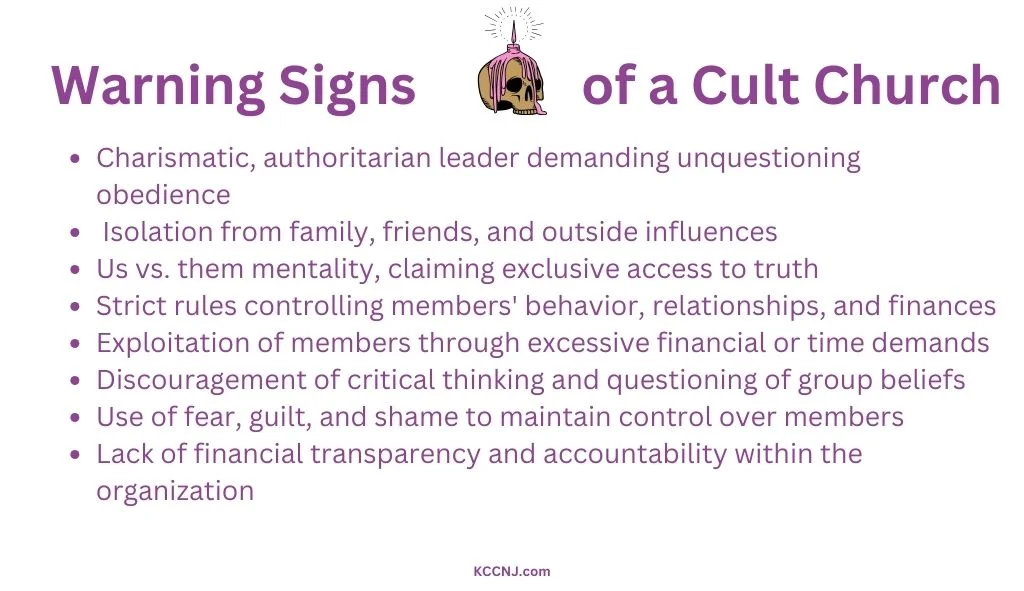25 Warning Signs of a Cult Church: Protect Yourself
A cult church exhibits controlling behaviors, extreme devotion to leaders, isolation tactics, and unorthodox doctrines. Learn the 25 key signs to help identify cult-like religious groups and protect yourself from their harmful influence.
Understanding Cult Churches
Cult churches are religious groups that deviate from mainstream beliefs and practices in ways that can be harmful to their members. They often employ manipulative tactics to control followers and maintain power. Recognizing the signs of a cult church is crucial for protecting oneself and others from potential exploitation and abuse.
What Defines a Cult Church?
A cult church typically has the following characteristics:
- A charismatic, authoritarian leader
- Extreme devotion and loyalty demanded from members
- Isolation from family and friends outside the group
- Unorthodox or heretical doctrines
- Use of manipulation and mind control techniques
- Financial exploitation of members
- Punishment for questioning or leaving the group
The Dangers of Cult Churches
Involvement in a cult church can have serious negative consequences:
- Emotional and psychological trauma
- Financial ruin
- Strained or broken family relationships
- Loss of personal autonomy
- Delayed personal and professional development
- Physical harm in extreme cases
25 Signs of a Cult Church
1. Charismatic, Authoritarian Leadership
Cult churches often have a single, charismatic leader who demands absolute obedience and loyalty. This leader may claim special divine revelation or authority.
2. Exclusive Truth Claims
The group insists that they alone have the truth and are the only path to salvation or enlightenment.
3. Love Bombing
New members are showered with attention, affection, and praise to create a strong emotional bond with the group.
4. Isolation from Outside Influences
Members are encouraged or required to cut ties with family and friends who are not part of the group.
5. Information Control
Access to outside information is restricted, and members are discouraged from critical thinking or questioning the group’s teachings.
6. Us vs. Them Mentality
The group fosters a strong sense of superiority over outsiders, who are often demonized or viewed as misguided.
7. Fear and Intimidation Tactics
Members are kept in line through threats of punishment, divine retribution, or social ostracism.
8. Financial Exploitation
The church demands significant financial contributions from members, often beyond their means.
9. Time Demands
Members are expected to devote excessive amounts of time to group activities, leaving little room for personal pursuits.
10. Confession and Humiliation
Public confessions of sins or shortcomings are used to break down individuals’ sense of self and increase vulnerability to manipulation.
11. Changing the Past
The group may encourage members to reinterpret their past experiences to align with the cult’s narrative.
12. Loading the Language
A unique vocabulary or jargon is used to create an insider mentality and make it difficult for members to communicate with outsiders.
13. Doctrine Over Person
Personal experiences or feelings that contradict the group’s teachings are dismissed or reinterpreted to fit the doctrine.
14. Group Identity Supersedes Individual Identity
Members are expected to conform to a specific mold, suppressing their individuality and personal goals.
15. Elitism
The group believes they are superior to all other religious or secular organizations.
16. Sexual Control
The leader or group may dictate members’ sexual practices, often in ways that benefit the leadership.
17. Apocalyptic Beliefs
The group may promote fear through end-times prophecies or impending doom scenarios.
18. No Legitimate Reason to Leave
Leaving the group is portrayed as spiritual failure or betrayal, with severe consequences.
19. Secretive Practices
The group engages in rituals or practices that are hidden from outsiders or new members.
20. Punishment for Disobedience
Members face harsh consequences for failing to follow rules or questioning leadership.
21. Emphasis on Recruiting
Members are pressured to constantly bring in new converts.
22. Deceptive Recruitment Practices
The true nature of the group may be hidden from potential recruits until they are deeply involved.
23. Lack of Financial Transparency
The group’s finances are not open to scrutiny by members.
24. Discouraging Critical Thinking
Questions or doubts are discouraged, and blind faith is praised.
25. Unreasonable Claims of Miracles or Supernatural Events
The leadership may claim to perform miracles or have supernatural powers to maintain their authority.

How Cult Churches Operate
Recruitment Tactics
Cult churches often use sophisticated recruitment strategies to attract new members:
- Targeting vulnerable individuals (e.g., college students, recent transplants to a new area)
- Using front organizations or events to draw people in
- Offering solutions to life’s problems or a sense of belonging
- Gradually introducing more extreme beliefs and practices
Indoctrination Process
Once recruited, new members undergo a process of indoctrination:
- Intense study of the group’s teachings
- Participation in time-consuming activities and rituals
- Gradual separation from outside influences
- Encouragement to recruit others
Maintaining Control
Cult churches use various methods to maintain control over their members:
- Regular reinforcement of the group’s beliefs
- Creating dependency on the group for emotional and spiritual needs
- Using guilt and fear to prevent questioning or leaving
- Monitoring members’ behavior and relationships
The Impact of Cult Churches on Individuals and Families
Psychological Effects
Involvement in a cult church can have severe psychological consequences:
- Anxiety and depression
- Post-traumatic stress disorder (PTSD)
- Loss of self-identity
- Difficulty trusting others
- Cognitive dissonance
Social Consequences
Cult involvement often leads to social isolation and relationship problems:
- Estrangement from family and friends
- Difficulty forming new relationships outside the group
- Challenges in workplace interactions
- Struggle to reintegrate into mainstream society after leaving
Financial Repercussions
Many cult members face financial hardship due to:
- Excessive donations to the group
- Neglect of career or education
- Difficulty managing finances independently after leaving
Recognizing the Difference Between Healthy Churches and Cult Churches
Healthy Church Characteristics
- Transparent leadership and finances
- Encouragement of critical thinking and questions
- Respect for individual autonomy and personal relationships
- Focus on serving others and the community
- Openness to differing viewpoints
Red Flags in Church Practices
- Pressure to make quick, life-changing decisions
- Discouragement of outside research or fact-checking
- Extreme emotional manipulation in services or interactions
- Insistence on conformity in all aspects of life
- Claims of exclusive access to truth or salvation
How to Help Someone Involved in a Cult Church
Approaching the Situation
- Maintain open communication and a non-judgmental attitude
- Express concern for the person’s well-being
- Avoid direct attacks on the group or its beliefs
- Encourage critical thinking through gentle questioning
Resources for Support
- Professional counselors specializing in cult recovery
- Support groups for former cult members and their families
- Educational materials on cult dynamics and recovery
Legal Considerations
In some cases, legal action may be necessary:
- Reporting financial fraud or abuse
- Seeking custody of children in dangerous situations
- Pursuing restitution for financial losses

Preventing Involvement in Cult Churches
Education and Awareness
- Learn about cult tactics and warning signs
- Develop critical thinking skills
- Maintain a support network of family and friends
Healthy Spiritual Practices
- Engage in personal study and reflection
- Seek out diverse perspectives on faith and spirituality
- Participate in transparent, community-oriented religious groups
Building Resilience
- Develop a strong sense of personal identity
- Learn to set healthy boundaries in relationships
- Cultivate emotional intelligence and self-awareness
Frequently Asked Questions
What is the difference between a cult and a legitimate religious group?
Legitimate religious groups respect individual autonomy, encourage critical thinking, and have transparent leadership. Cults, on the other hand, demand unquestioning obedience, isolate members from outside influences, and often exploit their followers financially or emotionally.
Can a person be in a cult without realizing it?
Yes, many cult members do not initially recognize the controlling nature of their group. The indoctrination process can be gradual, making it difficult for individuals to see the warning signs.
How do cults recruit new members?
Cults often target vulnerable individuals, use love bombing techniques, offer simple solutions to life’s problems, and gradually introduce more extreme beliefs and practices.
What should I do if I think a friend or family member is in a cult?
Maintain open communication, express concern without judgment, encourage critical thinking, and provide information about cult dynamics. Avoid direct attacks on the group, as this may cause the person to become defensive.
Is it possible to leave a cult?
Yes, it is possible to leave a cult, but it can be a challenging process. Many former cult members require support from family, friends, and professional counselors to recover and reintegrate into society.
KCCNJ advice
Recognizing the signs of a cult church is crucial for protecting oneself and others from the harmful effects of these groups. By understanding the tactics used by cults and maintaining a critical, informed perspective, individuals can make healthier choices in their spiritual lives and help those who may be vulnerable to cult influence. Remember that genuine faith communities foster personal growth, respect individual autonomy, and encourage open dialogue and questioning. If you suspect that you or someone you know may be involved in a cult church, seek support from trusted friends, family, or professional resources specializing in cult recovery.







